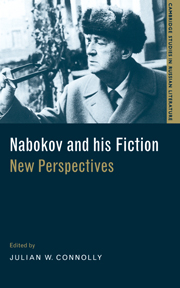Book contents
- Frontmatter
- Contents
- A note on the contributors
- A note on transliteration
- A note on abbreviations
- Acknowledgments
- Introduction: Nabokov at 100
- PART 1 ARTISTIC STRATEGIES AND THEMES
- PART 2 LITERARY AND CULTURAL CONTEXTS
- 7 Nabokov's (re)visions of Dostoevsky
- 8 Her monster, his nymphet: Nabokov and Mary Shelley
- 9 Vladimir Nabokov and Rupert Brooke
- 10 Clio laughs last: Nabokov's answer to historicism
- 11 Poshlust, culture criticism, Adorno, and Malraux
- Selected bibliography
- Index
- CAMBRIDGE STUDIES IN RUSSIAN LITERATURE
11 - Poshlust, culture criticism, Adorno, and Malraux
Published online by Cambridge University Press: 18 December 2009
- Frontmatter
- Contents
- A note on the contributors
- A note on transliteration
- A note on abbreviations
- Acknowledgments
- Introduction: Nabokov at 100
- PART 1 ARTISTIC STRATEGIES AND THEMES
- PART 2 LITERARY AND CULTURAL CONTEXTS
- 7 Nabokov's (re)visions of Dostoevsky
- 8 Her monster, his nymphet: Nabokov and Mary Shelley
- 9 Vladimir Nabokov and Rupert Brooke
- 10 Clio laughs last: Nabokov's answer to historicism
- 11 Poshlust, culture criticism, Adorno, and Malraux
- Selected bibliography
- Index
- CAMBRIDGE STUDIES IN RUSSIAN LITERATURE
Summary
In January 1937, with Hitler's Germany ever more dangerous for his Jewish wife and half-Jewish son, Vladimir Nabokov left Berlin, ostensibly on a reading tour but also to explore his options elsewhere; in July, he and his family moved to France for a brief second exile. There, as he wrote The Real Life of Sebastian Knight, he began the difficult process of becoming an English-language novelist. By that time the German-born sociologist of music and aesthetician Theodor Adorno, just four years his junior and himself partly Jewish, had lost his academic job in Frankfurt due to the Nazi racial laws. After a period in England, Adorno would move to the United States in 1938, two years before Nabokov, who departed in May 1940 on one of the last American steamers before France fell to Germany.
Though Nabokov and Adorno already enjoyed some recognition, neither of them became well-known internationally until after World War II. By contrast, their French contemporary André Malraux was a precocious celebrity, first in the Paris art world, then as a novelist, finally as an opponent of the Nazis. Two years younger than Nabokov, he had toured the United States for the Spanish Republic in 1937, only to witness Franco's victory early in 1939. With the coming of World War II he enlisted in a tank corps and was taken prisoner, but he soon escaped to the Vichy zone. Though his books were banned in occupied France, he managed to live for a time on smuggled advances from his American publisher.
Beyond the turmoil of persecution, flight, and exile, all three men would have strong personal reasons to know how lucky they were to survive Hitler's triumphs.
- Type
- Chapter
- Information
- Nabokov and his FictionNew Perspectives, pp. 216 - 235Publisher: Cambridge University PressPrint publication year: 1999

